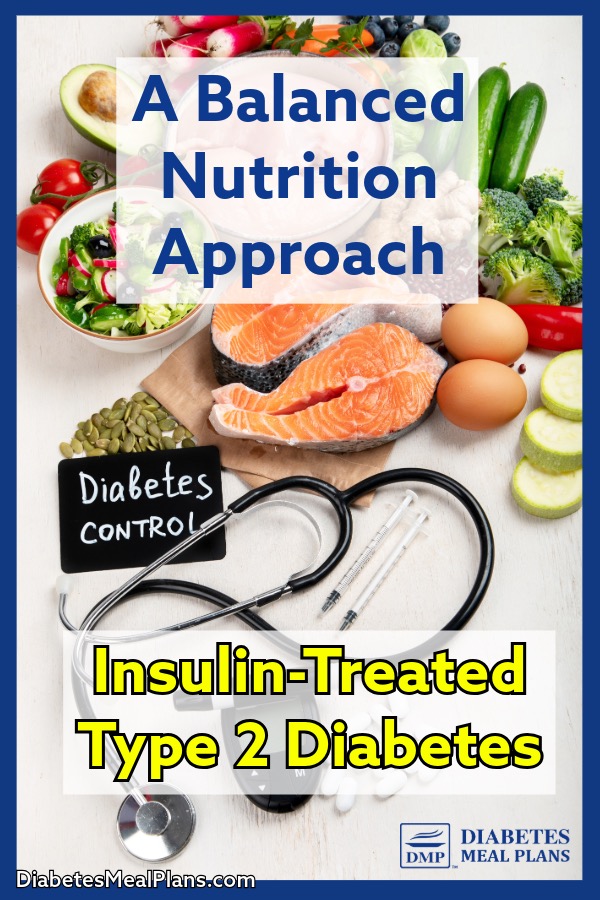Whether insulin-treated or not, the management of type 2 diabetes often calls for significant lifestyle changes, with diet and nutrition being key to successful health changes.
Researchers recently highlighted the challenges in engaging people with insulin-treated type 2 diabetes in intensive lifestyle interventions. The reality is, while extreme dietary measures can yield rapid results, they are usually not sustainable or practical for most people.
This underscores the need for balanced, nutrition-focused approaches that support sustainable nutrition change. Because when you take a balanced approach you can lower blood sugar, lose weight and reduce insulin dosages. In time you may also be able to stop insulin too – this is possible!
To get started with proper nutrition, download a free copy of our recommended food list.
The Scale of Type 2 Diabetes in the United States
In the United States, approximately 36 million people are living with type 2 diabetes, with approximately 25% of people being insulin-treated.
The distressing thing is, only 50% of people achieve glycemic control (a glycated hemoglobin level less than 7%), which is a primary goal of treatment and a goal every healthcare provider and organization needs to encourage in patients.
If your A1c levels are not under 7%, it is time to do something about it!
Understanding the Reluctance for Intensive Lifestyle Interventions
In a research letter published in Diabetes, Obesity and Metabolism, Cathy J. Sun, MD, and colleagues from The Ottawa Hospital, revealed that only a small fraction of eligible patients with insulin-treated type 2 diabetes showed interest in participating in a 24-week intensive lifestyle intervention.
This intervention involved an initial phase of significant calorie restriction, followed by a gradual increase to a neutral energy balance. The primary reasons for refusal were the intensity of the dietary restrictions, the demanding nature of the program, and the impact on social life.
The authors suggested that “optimal ways to approach and support patients with insulin-treated type 2 diabetes for intensive lifestyle interventions remain to be established.”
We disagree, as we’ve been supporting insulin-treated people for years to achieve incredible results and reduce or stop insulin. The true question is whether pursuing an ‘intensive’ approach is really necessary?

The Importance of Nutrition Without Extremes
Without a doubt, nutrition is central to the management of type 2 diabetes. Research shows that nutrition modification can be as effective as many oral medications, and it can successfully reduce medication usage, including in those with insulin-treated type 2 diabetes.
In people with diabetes, polypharmacy is a major concern leading to complications in older individuals, so any reduction in medication offers significant health benefits.
One of the key issues with many dietary studies is they frequently exclude insulin-treated patients with type 2 diabetes, due to potential risks and inability to manage these given the resources available in clinical trials.
However, what is known from studies in type 2 diabetes patients overall, is that extreme diets, such as those with very low-calorie intake or for ketogenic diets, while effective in the short term, are often unsustainable.
In the real world, people find extreme diets difficult to adhere to, leading to potential relapse into unhealthy eating habits and substantial weight regain. That’s certainly not what you want!
In contrast to severe restrictions, lower carbohydrate diets such as the one we encourage here at DMP, focus on encouraging nutrient dense foods, high intake of dietary fiber, and overall quality nutrition.
Providing a realistic and sustainable approach is key to achieving key clinical outcomes such as significant improvements in glycemic control, weight management, medication reduction and overall health.
Lyn said: With DMP I’ve lost 42 pounds (19kg) and halved my insulin dosages. With DMP and my doctors support, I am working toward stopping insulin.
Achieving Sustainable Behavior Change Is Key
The key to successful diabetes management lies in a sustainable approach that leads to sustainable change.
People with type 2 diabetes often need dietary education and support to achieve sustainable change. Unfortunately, across the United States there is poor uptake of diabetes education.
One promising avenue to support sustainable change is the use of digital interventions. Scientifically-proven digital programs such as our T2Diet Program are life-changing for people!
Dusty said: “When I started DMP, I was 310 lbs (140kg) and my A1C was 10. I had a very unhealthy lifestyle. Since then, I have lost weight, I am at 190 lbs (86kg) now and my A1C is between 6.5 to 7.0 and no longer have to take medicine. Thank you for what you do!”
Provided alongside the care of your GPs and other healthcare professionals, digital health platforms offer several advantages, such as a wealth of educational materials that can help you understand your condition better and make informed choices, accessibility and convenience, ongoing support and a sense of community, all of which empower you to take an active role in managing your diabetes.
At DMP, we’ve found that even if you’re insulin-treated you can make significant and sustainable progress with your health. Through reduction of carbohydrate content, a focus on nutrient dense foods, awareness of factors like time in range and high readings, and through small consistent changes over time, you can reach your glucose and health goals.
The key point is, you don’t need to go to extremes! Extremes often lead to failure and worse outcomes over time.
Instead, take a balanced nutrition approach and get ongoing support – that is the pathway to success!
To get started with proper nutrition so you can lower your blood sugar, weight and insulin dosages, download a free copy of our recommended food list.

Leave a Reply